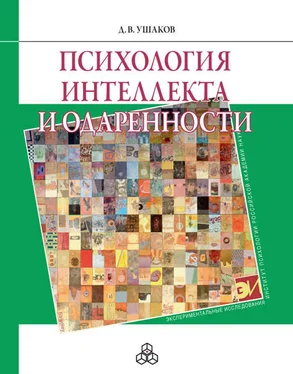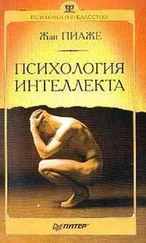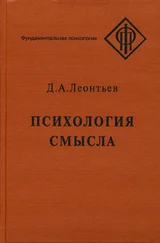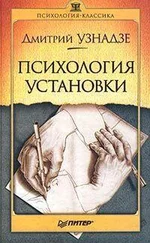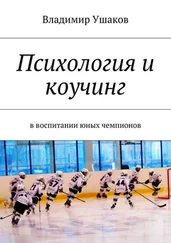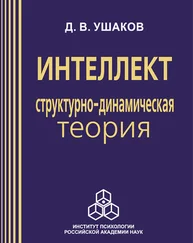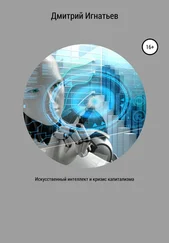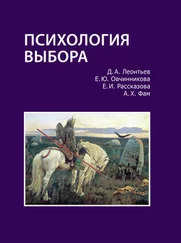Cicirelli V. G. Sibling constellation, creativity, IQ and academic achievement // Child Development. 1978. 12. P. 369–370.
Charness N., Krampe R., Mayr U. The role of practice and coaching in entrepreneurial skill domains: an international comparison of life-span chess skill acquisition // K. A. Ericsson (ed.). The road to excellence. New Jersey, 1996. P. 51–80.
Cheng P., Holyoak K. J. Pragmatic reasoning schemas // Cognitive psychology. 1985. 17. P. 391–416.
Cherny S. S., Fulker D. W., Hewitt J. K. Cognitive development from infancy to middle childhood // R. J. Sternberg, E. Grigorenko (eds). Intelligence, heredity, and environment. Cambridge University Press. 1997. P. 463–482.
Clark M. S., Isen A. M. Towards understanding the relationship between feeling states and social behavior // A. H. Hastorf, A. M. Isen (eds). Cognitive social psychology. N. Y.: Elsevier – North Holland, 1982. P. 73–108.
Clasen D., Hanson M. Double mentoring: A process for facilitating mentorships for gifted students // Roeper Review. 1987. 10. P. 107–110.
Coleman L. Schooling the gifted. Reading, MA: Addision Wesley, 1985.
Cosmides L. The logic of social exchange: Has natural selection shaped how humans reason? Studies with the Wason selection task // Cognition. 1989. 31. P. 187–276.
Daurio S. P. Educational enrichment versus acceleration: a review of the literature // W. C. George, S. J. Cohn, J. C. Stanley (eds.) Educating the gifted: Acceleration and enrichment. Baltimore, MD: Johns Hopkins University Press, 1979. P. 13–63.
Davenport K. S., Remmers H. H. Factors in state characteristics related to average A-12 V-12 test scores // Journal of Educational Psychology. 1950. 41. P. 110–115.
Davidson J. E., Sternberg R. J. The role of insight in intellectual giftedness // Gifted Child Quarterly. 1984. 28. P. 58–64.
Davis D. J., Cahan S., Bashi J. Birth order and intellectual development: the confluence model in the light of cross-cultural evidence // Science. 1977. 196. P. 1470–1472.
de Charms R., Moeller G. H. Values expressed in American children’s readers: 1880–1950 // Journal of Abnormal and Social Psychology. 1962. 64. P. 136–142.
Demetriou A., Efklides A. Experiential structuralism and neo-Piagetian theories: towards an integrated model // International Journal of Psychology. 1987. 22. P. 173–198.
Detterman D. K. Theoretical notions of intelligence and mental retardation // American Journal of Mental Deficiency. 92. 1987. P. 2–11.
Detterman D. K. Assessment of basic cognitive abilities in relation to cognitive deficits // American Journal on Mental Retadation. 97. 1992. P. 2 51–2 8 6.
Devries R. Relationships among Piagetian, IQ and achievement assessment // Child development. 1974. 45. P. 746–756.
Dickerson R. E. Exponential correlation of IQ and the wealth of nations // Intelligence. 2006. 34 (3). P. 291–295.
Dodds R. A., Ward T. B., Smith S. M. The Use of Environmental Clues During Incubation // Creativity Research Journal. 2002. V. 14. №№ 3&4. P. 287–304.
Doise W. Idées nouvelles et notions anciennes // J.-L. Beauvois, R.-V. Joule, J.-M. Monteil (eds). Perspectives cognitives et conduites sociales. 1. Théories implicites et conflits cognitifs. Suisse, Cousset: Editions Del Val, 1987. P. 229–243.
Donnelly E. F., Murphy D. L., Goodwin F. K., Waldman I. N. Intellectual function in primary affective disorder // British Journal of Psychiatry. 1982. 140. P. 633–636.
Du Don au Talent Paris: Eurotalent, 1998.
Dunker K. On problem solving. Psychological Monographs. 58. № 270. 1945.
Dweck C. S., Bempechat J. Children’s theories of intelligence: consequences for learning // S. G. Paris, G. M. Olson, H. W. Stevenson (eds.) Learning and motivation in the classroom. Hillsdale, NJ: Lawrence Erlbaum Associates, 1983. P. 239–256.
Erdle S., Irving P., Rushton J. P. Park J. The general factor of personality and its relation to self-esteem in 628 640 Internet respondents. Personality and Individual Differences, 48. 2010. P. 343–346.
Eysenck H. J. Training in clinical psychology: an English point of view // American Psychologist. 1949. 4. P. 173–176.
Eysenck H. J. Function and training of the clinical psychologist // Journal of Mental Science. 1950. 96. P. 1–16.
Eysenck H. J. The Effects of Psychotherapy: An Evaluation // Journal of Consulting Psychology. 16. 1952. P. 319–324.
Eysenck H. J. The IQ argument: Race, intelligence and education. N. Y.: Library Press, 1971.
Evans J. S. B. T. Bias in human reasoning: Causes and consequences. Hove, UK: Lawrence Erlbaum Ltd., 1989.
Facon B., Bollengier T., Grubar J. C. Deficience mentale: influence de la dissociation entre efficience et experience // Enfance. 1994. 1. P. 71–81.
Feldman D. H. Nature’s Gambit: Child Prodigies and the Development of Human Potential. N. Y.: Basic Books, 1986.
Feng A. X., Campbell J. R., Verna M. A. The talent development of American Phisics Olympians // Gifted and talented international. 2001. 16. 2. P. 10 8 –114.
Fiedler K. Towards an integrative account of affect and cognition phenomena using the BIAS computer algorithm // J. P. Forgas (ed.). Feeling and thinking: The role of affect in social cognition. N. Y.: Cambridge University Press, 2000.
Finke R. A. Imagery, Creativity, and Emergent Structure. Consciousness and cognition. 1995. 5. P. 381–393.
Finkel D., Pedersen N. L., McGue M., McClearn G. E. Heritability of cognitive abilities in adult twins: Comparison of Minnesota and Swedish data // Behavior Genetics. 1995. 25. P. 421–432.
Fischhoff B. Judgment and decision making // R. J. Sternberg, E. E. Smith (eds). The psychology of human thought. Cambridge University Press, 1991. P. 155–187.
Fisher K. W., Farrar M. J. Generalization about generalization: how a theory of skill development explains both generality and specificity // International Journal of Psychology. 1987. 22. P. 137–150.
Fisher K., Stewart J. Dunker’s analysis of problem solving as microdevelopment // From Past to Future. 1999. V. 1 (2). The Drama of Karl Dunker. P. 45–50.
Fisher R. P., Craik F. Interaction between encoding and retrieval operations in cued recall // Journal of Experimental Psychology: Human Learning and Memory. 1977. V. 3. No. 6. P. 701–711.
Flynn J. R. The mean IQ of Americans: Massive gains 1932 to 1978 // Psychological Bulletin. 1984. 101. P. 171–191.
Fodor J. The modularity of mind. Cambridge, Mass.: MIT Press, 1983.
Fowler W., Ogston K., Roberts G., Steane D., Swenson A. Potentials of Childhood, V. 2: Studies in Early Developmental Learning. Lexington, Mass.: Heath, 1983.
Fowler W., Ogston K., Roberts G., Swenson A. The effects of early language enrichment // Early Child Development and Care. V. 176. № 8. December 2006. P. 777–815.
Freeman J. The Gulbenkian project of gifted children // Gifted children. Looking to their future. Latimer, London, 1976.
Freeman J. Gifted Children Grown Up. David Fulton Publishers. London, 2001.
Friedman R. S., Fishbach A., Förster J., Werth L. Attentional priming effects on creativity // Creativity Research Journal. 2003. V. 15. №№ 2&3. P. 27 7–2 8 6.
Frieze I. H., Weiner B. Cue utilization and attributional judgments for success and failure // Journal of Personality. 1971. 39. P. 591–605.
Fulker D. W., Cherny S. S., Cardon Lon R. Continuity and change in cognitive development // R. Plomin, G. E. McClearn (eds). Nature, nurture and psychology. Washington, DC: APA, 1993. P. 77–97.
Читать дальше
Конец ознакомительного отрывка
Купить книгу
